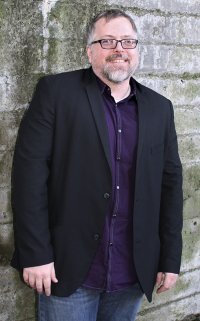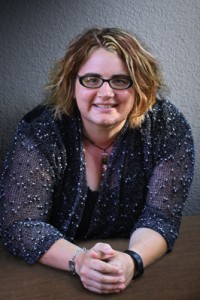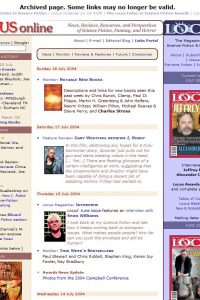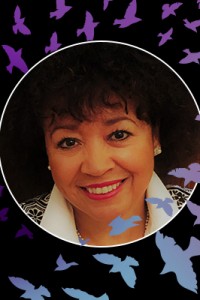Jeff VanderMeer: South of Reality
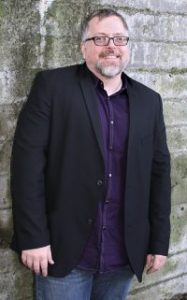
Jeffrey Scott VanderMeer was born July 7, 1968 in Belfont PA, and grew up in the Fiji Islands (where his parents worked for the Peace Corps), Ithaca NY, and Gainesville FL, where he attended the University of Florida for three years. He went to Clarion in 1992.
VanderMeer’s first story of genre interest was ‘‘So the Dead Walk Slowly’’, appearing when he was in college in 1989. His first book was self-published collection The Book of Frog (1989), and other collections include The Book of Lost Places (1996), Secret Life (2004), Secret Lives (2006), The Surgeon’s Tale and Other Stories (2007, with Cat Rambo), World Fantasy Award finalist The Third Bear (2010). His novelette The Situation (2009) was a Shirley Jackson Award nominee, and was adapted as a web comic with a script by VanderMeer and art by Eric Orchard. Some of his poetry was collected in Lyric of the Highway Mariner (1991) and The Day Dali Died: Poetry and Clash Fiction (2003).
VanderMeer’s pioneering New Weird series, Ambergris, began with Sturgeon Memorial Award-winning novella Dradin, in Love (1996) and continued with World Fantasy Award winner ‘‘The Transformation of Martin Lake’’ (1998), novellas ‘‘The Strange Case of X’’ (1999) and ‘‘The Hoegbotton Guide to the Early History of Ambergris by Duncan Shriek’’ (1999), all collected in City of Saints and Madmen: The Book of Ambergris (2001; updated with new stories in 2002). Other works in that world include Shriek: An Afterword (2006) and World Fantasy and Nebula Award nominee Finch (2009). He also published World Fantasy and Bram Stoker Award nominee Veniss Underground (2003), and a tie-in Predator novel in 2008. His newest fiction project, the Southern Reach trilogy, has garnered impressive commercial and critical attention, including publication in 16 countries and a movie deal from Paramount Pictures. The Southern Reach trilogy began with Annihilation (2014) and continues with Authority (2014) and the forthcoming Acceptance.
VanderMeer has been a prolific editor since the 1980s, when he founded The Ministry of Whimsy Press while still in high school, and in 1989 began publishing ’zine Jabberwocky, which ran for two issues. He co-edited three volumes of the Leviathan anthology series, including the Dick Award nominated and World Fantasy Award-winning third volume (2002, with Forrest Aguirre). He edited anthologies Album Zutique (2003), and Hugo Award finalists The Thackery T. Lambshead Pocket Guide to Eccentric and Discredited Diseases (2003, with Mark Roberts), and Monstrous Creatures: Explorations of Fantasy Through Essays, Articles and Reviews (2011).
With wife Ann VanderMeer (née Kennedy, married 2002), he worked on the Best American Fantasy anthologies, which published volumes in 2007, 2008, and 2010. They have co-edited numerous anthologies and non-fiction books, including Fast Ships, Black Sails (2008), The New Weird (2008), World Fantasy Award finalist Steampunk (2008), Last Drink Bird Head (2008), Steampunk II: Steampunk Reloaded (2010), World Fantasy Award nominee The Thackery T. Lambshead Cabinet of Curiosities (2011), World Fantasy Award winner The Weird: A Compendium of Strange and Dark Stories (2011), Odd? (2011), The Time Traveler’s Almanac (2014), and feminist SF anthology Sisters of the Revolution, forthcoming. They co-wrote humorous volume The Kosher Guide to Imaginary Animals (2010), and together run e-book publisher Cheeky Frawg Books and website Weird Fiction Review . They were nominated for a World Fantasy Award in the Special Award, Professional category in 2013.
VanderMeer’s non-fiction includes essay collection Why Should I Cut Your Throat & Other Nonfiction (2002), Booklife: Strategies and Survival Tips for the 21st-Century Writer (2009), and The Steampunk Bible: An Illustrated Guide to the World of Imaginary Airships, Corsets and Goggles, Mad Scientists, and Strange Literature (2011, with S.J. Chambers), and sequel The Steampunk User’s Manual, with Desirina Boskovich, forthcoming. His latest book of non-fiction is BSFA Award winner and Hugo Award finalist Wonderbook: The Illustrated Guide to Creating Imaginative Fiction (2013). He has taught at Clarion and regularly teaches at the teen workshop Shared Worlds.
The VanderMeers live in Tallahassee FL.
Excerpts from the interview:
‘‘Ideas creep in from all over the place, but for the Southern Reach there was a central dream that I had (which is the same way that almost all of my books have come about): I was dreaming of walking down a tunnel and seeing living words on the wall, and then eventually I realized I was going to see whatever was writing them… and I woke up. I remember distinctly that some part of my brain was saying, ‘If you see it, you’re never going to write the books.’ So I went back to sleep, and then in the morning I had pretty much the whole story in my head.
 ‘‘I had wanted to write about north Florida, and what came out of that desire through the dream is an idea about an expedition into an area that’s been cut off from the rest of civilization for 30 years, at the point of the first book, Annihilation. A secret government agency, the Southern Reach, has been sending expeditions into this ‘Area X’ to try to figure out what’s going on in there, but pretty much every expedition has come apart at the seams, and they haven’t found out what’s happening.
‘‘I had wanted to write about north Florida, and what came out of that desire through the dream is an idea about an expedition into an area that’s been cut off from the rest of civilization for 30 years, at the point of the first book, Annihilation. A secret government agency, the Southern Reach, has been sending expeditions into this ‘Area X’ to try to figure out what’s going on in there, but pretty much every expedition has come apart at the seams, and they haven’t found out what’s happening.
‘‘The setting of the Southern Reach trilogy is basically the 14-mile hiking trail that I do out at St. Marks Wildlife Refuge. Somebody I told the plot of Annihilation to said there were much stranger things going on at St. Marks than I knew, and my novel was not very proactive in that department at all! The expedition in my book gets charged by a wild boar: that actually happened to me out there. So did seeing dolphins in the freshwater canals. All these things make the setting of the series very personal to me, and meant that I didn’t really have to think much about it, so that allowed me to relax into the situation.
‘‘The fact that Annihilation is set in the real world makes a big difference. A reader who might not pick up a literary fantasy set in an imaginary world is more likely to pick up something about a strange expedition in our world. It’s still basically the real world (as becomes more clear in the second book), but I think the main thing is, from the genre looking out, it may not look like as much of a shift in what I write as it does from outside the genre looking in. If you’re writing imaginary-world fantasy on a more literary (or even experimental) side, you’re in this position where you have to get readers from both mainstream and genre, but you’re not drawing from the core of either.”
…
‘‘The trilogy is basically three complete, self-contained stories about three different characters. Obviously, Annihilation will leave people who want everything answered wanting to read Book Two, but there are also readers and reviewers who have been perfectly satisfied with it as a standalone novel. The second book, Authority, allowed me to delve a bit into the small-town South and places like that, without ever naming them, and get their flavor. I’ve been chuckling over a couple of (very positive) reviews of Authority where they say, ‘How the hell can I possibly explain this?’ I think, ‘Have you ever worked for a government agency?’ That bureaucratic element draws on personal experience, since I once had to go to every branch of a particular agency, and those are usually in the most remote areas you can think of. I had a crap-load of adventures throughout my day-job phase, and that stuff eventually came out in these novels. The third book, Acceptance, is divided equally between the Southern Reach and Area X, and has four different viewpoint characters. You find out more about the biologist, and I promise that readers will get answers – the ones they deserve and the ones they’re looking for.
‘‘The other thing that I keep coming up against in my fiction is how people react to something that is inexplicable. We’re living on an alien planet to begin with, because we don’t even know this
world that we are, in effect, colonizing, and subjecting to our will all the time. I really, truly believe that in order to survive as a species (and this is a very science-fictional theory), we need to be able to imagine the world without us in it. This isn’t to say I think the world should be without us in it, but that we have to get beyond the idea that everything is here either to serve us, or that we’re here to be a steward for it. That tends to be the major default position in books that are not really about nature but include nature. They can Disneyify everything to the point where it becomes dangerous, because that view of nature bleeds into their positions on various issues in the real world in ways that are detrimental to trying to find solutions.”
…
‘‘Although the books feature conspiracies, I’m not a conspiracy theorist at all. I actually think conspiracy theorists muddy the water regarding the true complexity of situations. Especially now, with social media and some news outlets starting to do joke stories, you don’t just have misinformation or biased points of view; you literally have ‘spam history’ out there! Individuals have to sort through everything and try to figure out what is closest to some kind of baseline reality or truth.”
…
‘‘The next book I’m doing is The Steampunk User’s Manual, with my coauthor Desirina Boskovich, out from Abrams in October. It’s kind of pushing the edge on retrofuturism – not really like The Steampunk Bible at all. It’s like a craft book that’s also for people who never wanted to do a goddamned craft in their lives, but would like to see how an impossible craft project can be done. You could build a giant steam-powered penguin after reading this book (if you had the resources); chances are, you won’t. Maybe it’s a little cynical to assume that many people just buy craft books to look at the pictures, but I thought, ‘Everyone is doing these craft books wrong. Some of it should be stuff no one could ever make.’
‘‘I am also working on a novel called The Book Murderer, which I’m having a lot of fun writing – though I don’t know if I will survive its publication, because (in altered form) it’s pretty much every horror story I’ve ever heard of or experienced in the publishing industry over the last 30 years. It’s about this guy who has the idea that he’s going to destroy every book in the world. He knows it’s impossible, but if he were to destroy just a certain number of books he’ll feel like he’s made his mark. He plays headgames with writers on the Internet, and he becomes an assistant to a writer on a book tour so he can learn what the enemy is up to.”


